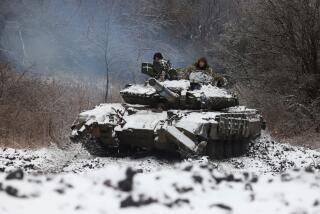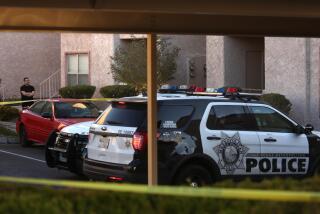Poison also found in Italian
- Share via
LONDON — An Italian KGB expert who had warned poisoned Russian dissident Alexander Litvinenko that his life might be in danger has a “significant quantity” of radioactive polonium-210 in his body, authorities said Friday.
British health officials also said they had detected a small quantity in a close relative of Litvinenko. Neither has shown signs of illness.
The announcements came as police zeroed in on radiation found on British Airways jets that flew between Moscow and London, one of which might have transported suspects carrying the poison.
After days of investigation, police have begun to trace a radiation trail across flight manifests and London hotels and offices that security experts said could eventually pinpoint how the radioactive substance was brought to London and possibly by whom.
The exposure of Italian academic Mario Scaramella increases the likelihood that the poison was administered at the sushi restaurant in central London where the two men met briefly Nov. 1 -- hours before Litvinenko became sick -- especially since the radiation trail appears to follow Litvinenko’s movements across London after that rendezvous.
Scaramella has done exhaustive research into the archives of Vasili Mitrokhin, a KGB major who defected to the West in 1992 and took along numerous secret files. Scaramella became acquainted with several former KGB agents, including Litvinenko, who had accused his former colleagues of involvement in several killings and assaults and had obtained political asylum in Britain.
The Italian asked Litvinenko to meet with him after he received an e-mail suggesting that criminals in St. Petersburg, Russia, were behind the recent slaying of Russian journalist Anna Politkovskaya in Moscow and were preparing to strike against Litvinenko and Scaramella.
Litvinenko discounted the threat, and the meeting was brief. Scaramella, who had already eaten, had only a glass of water. Litvinenko ate lunch. He died 22 days later in a London hospital.
Scaramella has cooperated in the investigation, and authorities have not identified him as a suspect. After he arrived at London’s University College Hospital on Friday wearing a mask, hospital officials said he had been admitted for examination.
“Tests have detected polonium-210 in Mr. Scaramella’s body, but at a considerably lower level than Mr. Litvinenko. He is currently well and shows no symptoms of radiation poisoning,” hospital spokesman Dr. Keith Patterson said in a statement.
Meanwhile, in another possible poisoning, former acting Prime Minister Yegor T. Gaidar remained hospitalized in Moscow with a still-undiagnosed ailment. He fell ill suddenly a week ago during an academic conference in Ireland.
British police are investigating whether there are any links between the two cases.
After meeting with Scaramella, Litvinenko had tea with his former partner in the KGB, Andrei Lugovoy -- who was on Gaidar’s security detail in the early 1990s, a Gaidar aide confirmed Friday. After Lugovoy left the KGB, he became head of security at the Russian television network ORT. He remained friends with Litvinenko.
Lugovoy was in London with his family and numerous other Russian soccer fans for a match between Moscow’s CSKA team and London’s Arsenal, according to the Moscow newspaper Kommersant.
Russian businessman Dmitry Kovtun accompanied Lugovoy to the Litvinenko meeting at London’s elite Millennium Hotel, where several traces of polonium-210 reportedly have been found.
Litvinenko, who left a note blaming Russian President Vladimir V. Putin for his impending death, was convinced he was poisoned at one of the two meetings but was not sure which, close friend Alex Goldfarb said in an interview.
“He clearly said that he knows it’s one of them, but he didn’t want to accuse anybody because he would hate to put a shadow on an innocent person,” Goldfarb said. He works for a foundation funded by exiled Russian billionaire Boris Berezovsky, whose offices, visited by Litvinenko after his poisoning, also showed traces of polonium-210.
And another finger pointed at Russian security services. According to a Nov. 18 letter to Litvinenko from former KGB agent Mikhail Trepashkin: In 2002, Trepashkin reported a meeting with a Russian agent who spoke of “a very serious group” that would be “snuffing out everybody connected with Berezovsky and Litvinenko.”
Trepashkin’s letter said the agent worked for the Federal Security Service, the KGB’s successor, and sought details about Litvinenko’s family.
Trepashkin was the primary source for a book by Litvinenko accusing Russia’s government of organizing several apartment-building explosions across Russia before the second Chechen war. A copy of his letter to Litvinenko was provided Friday to The Times by sources in Russia.
Goldfarb released a similar letter from Trepashkin, dated the day of Litvinenko’s death. He called on British authorities to question Trepashkin, who is in prison in Russia on charges of revealing state secrets.
Trepashkin “names names,” Goldfarb said.
The Guardian newspaper, quoting unidentified British intelligence sources, reported that London police were coming closer to the view that “rogue elements” within or formerly with the Federal Security Service probably were involved in the killing.
It said police were “closing in on” five or more men who arrived on soccer fans’ flight and returned to Moscow soon after.
Times staff writer Sergei L. Loiko in Moscow contributed to this report.
*
(BEGIN TEXT OF INFOBOX)
Radiation traces
Italian security agent Mario Scaramella tested positive for polonium-210, the same radioactive substance that killed former KGB agent Alexander Litvinenko. A close relative of Litvinenko also tested positive. Radiation was detected at a number of sites in London.
Traces of radiation at these locations visited by Litvinenko:
1. Meeting on the day he is believed to have been poisoned
2. Restaurant where he ate with Scaramella on Nov. 1
3. Litvinenko family home
4. Hospital where Litvinenko was first treated
5. Hospital where he died
6. Business intelligence company
7. Reported offices of Russian tycoon Boris Berezovsky
8. Sheraton Hotel on Park Lane
9. Office building
---
Sources: ESRI, Associated Press
More to Read
Sign up for Essential California
The most important California stories and recommendations in your inbox every morning.
You may occasionally receive promotional content from the Los Angeles Times.













